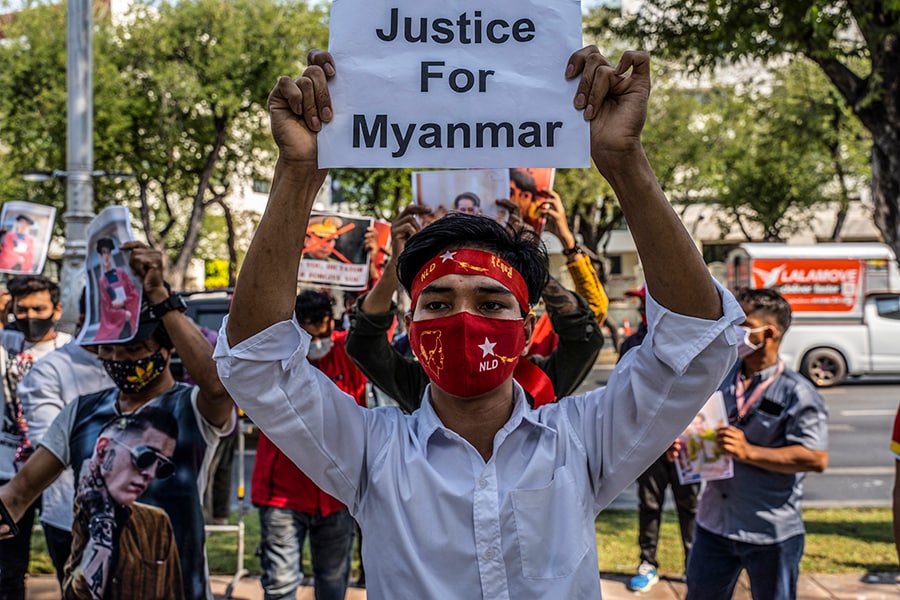
After coup, Myanmar military charges Suu Kyi with obscure infraction
Three days after Myanmar's military seized power in a coup, Aung San Suu Kyi, has been charged with illegally importing at least 10 walkie-talkies, that could land her in prison for up to three years
 A person wearing a National League for Democracy (NLD) face mask and headband holds a signs during a demonstration outside the United Nations headquarters in Bangkok on Wednesday, Feb. 3, 2021, protesting the recent military coup in Myanmar. Daw Aung San Suu Kyi, the Myanmar civilian leader deposed by the military in a coup, was charged on Wednesday with an obscure infraction: having illegally imported at least 10 walkie-talkies, according to an official from her National League for Democracy party; Image: Adam Dean/The New York Times
A person wearing a National League for Democracy (NLD) face mask and headband holds a signs during a demonstration outside the United Nations headquarters in Bangkok on Wednesday, Feb. 3, 2021, protesting the recent military coup in Myanmar. Daw Aung San Suu Kyi, the Myanmar civilian leader deposed by the military in a coup, was charged on Wednesday with an obscure infraction: having illegally imported at least 10 walkie-talkies, according to an official from her National League for Democracy party; Image: Adam Dean/The New York Times
Three days after Myanmar’s military seized power in a coup, a court charged the country’s civilian leader, Aung San Suu Kyi, with an obscure infraction that could land her in prison for up to three years: illegally importing at least 10 walkie-talkies.
It was a bizarre postscript to a fraught 48 hours in which the army placed the country’s most popular leader back under house arrest and extinguished hopes that the Southeast Asian nation could one day serve as a beacon of democracy in a world awash with rising authoritarianism.
The surprise use of walkie-talkies to justify locking up a Nobel Peace Prize laureate reinforced the military’s penchant for using fine-grained strategy to neutralize its greatest political rival. The country’s ousted president was also facing jail time for alleged violations of coronavirus restrictions.
The court order to detain Suu Kyi, which was provided by officials from her party, the National League for Democracy, was dated on the day of the coup and authorized her detention for 15 days. The document said soldiers searching her villa in Naypyitaw, the capital, had turned up various pieces of communications equipment that had been brought into the country without proper paperwork.
The coup unseated an elected government that was viewed by voters as the last defense against a military that had ruled the country outright for nearly five decades. During its five-year tenure the National League for Democracy received two resounding mandates, most recently in general elections last November.
©2019 New York Times News Service




